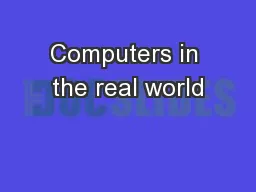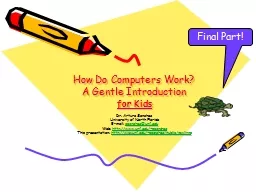PPT-Should We Trust Computers?
Author : trish-goza | Published Date : 2016-08-04
Martyn Thomas CBE FREng Livery Company Professor of Information Technology 1 wwwcyberlivinguk cyberliving Join the discussions Visit and discuss at httpwwwcyberlivinguk
Presentation Embed Code
Download Presentation
Download Presentation The PPT/PDF document "Should We Trust Computers?" is the property of its rightful owner. Permission is granted to download and print the materials on this website for personal, non-commercial use only, and to display it on your personal computer provided you do not modify the materials and that you retain all copyright notices contained in the materials. By downloading content from our website, you accept the terms of this agreement.
Should We Trust Computers?: Transcript
Download Rules Of Document
"Should We Trust Computers?"The content belongs to its owner. You may download and print it for personal use, without modification, and keep all copyright notices. By downloading, you agree to these terms.
Related Documents














